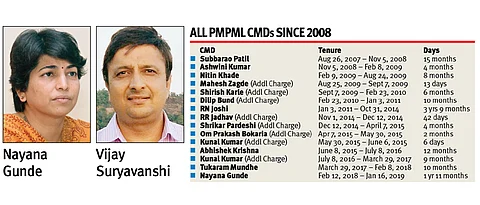

PUNE: The Pune Mahanagar Parivahan Mahamandal Limited (PMPML) has seen 16 chairman and managing directors (CMD) since formation in 2007. The State Government has appointed Vijay Suryavanshi, who was the district collector of Raigad, as its new CMD.
He has replaced Nayana Gunde, who served for one year 11 months as CMD of public transport utility. In 2007, Pune and Pimpri Chinchwad bus transport services (PMT and PCMT) were merged to form the PMPML.
The post of CMD was created to run the public bus transport body. For this post, the State Government appoints an IAS-ranked officer. Subbarao Patil was the first CMD. He held the post for 15 months. After forming PMPML, five CMDs were appointed from October 2007 to January 2011. On January 3, 2011, RN Joshi took charge and completed his tenure of three years, the only CMD to complete the full tenure among the 15 CMDs.
Later, Shrikar Pardeshi served for four months. He was sent to join the Prime Ministers’ Office in New Delhi. Then Omprakash Bakoriya and Kunal Kumar were given the additional charge before appointing Abhishek Krishna as the full-time CMD in June 2015. However, within a month, he was transferred to Nashik as the municipal commissioner.
Tukaram Mundhe came as the next full-time CMD in March 2017. He streamlined the operations and took strict action against indiscipline. However, his so-called ‘high handed’ attitude cost him the post as he was transferred even before he could complete a year as PMPML staffers and local politicians complained against him. He was replaced by Gunde in February 2018.
Out of 15 CMDs, eight held the additional charge of CMD. Pardeshi and Mundhe took some bold decisions to improve the services.
The activists who always raised the issue of PMPML are upset with the back to back transfer of CMDs who were trying to improve the PMPML.
“Sudden transfers have become a tradition at the PMPML and a lack of a sustained vision has resulted in inefficiency at the transport body,” said Jugal Rathi.
Rathi alleged that the PMPML administration often works for the benefit of union members, contractors and corporators rather than for commuters.
